- Home
- John Berger
To the Wedding
To the Wedding Read online
JOHN BERGER
TO THE WEDDING
John Berger was born in London in 1926. He is well known for his novels and stories as well as for his works of nonfiction, including several volumes of art criticism. His first novel, A Painter of Our Time, was published in 1958, and since then his books have included the novel G., which won the Booker Prize in 1972, and the peasant trilogy Into Their Labours, which includes Pig Earth (1979), Once in Europa (1987), and Lilac and Flag (1990). His six volumes of essays include Keeping a Rendezvous (1991), The Sense of Sight (1985), and Ways of Seeing (1972). In 1962 Berger left Britain permanently, and he now lives in a small village in the French Alps.
Also by JOHN BERGER
Into Their Labours
(Pig Earth, Once in Europa, Lilac and Flag: A Trilogy)
A Painter of Our Time
Permanent Red
The Foot of Clive
Corker’s Freedom
A Fortunate Man
Art and Revolution
The Moment of Cubism and Other Essays
The Look of Things: Selected Essays and Articles
Ways of Seeing
Another Way of Telling
A Seventh Man
G.
About Looking
And Our Faces, My Heart, Brief as Photos
Keeping a Rendezvous
FIRST VINTAGE INTERNATIONAL EDITION, MARCH 1996
Copyright © 1995 by John Berger
All rights reserved under International and Pan-American Copyright Conventions. Published in the United States by Vintage Books, a division of Random House, Inc., New York, and simultaneously in Canada by Random House of Canada Limited, Toronto. Originally published in hardcover by Pantheon Books, a division of Random House, Inc., New York, in 1995.
Portions of this work have been published previously in The New Yorker.
Grateful acknowledgment is made to Warner Bros. Publications Inc. for permission to reprint an excerpt from “Strange Days,” words and music by The Doors, copyright ©1967 by Doors Music Co. All rights reserved. Made in USA. Reprinted by permission of Warner Bros. Publications Inc., Miami, FL, 33014.
The royalties from this book will be given to the Harlem United Community AIDS Center (207 West 133rd Street, New York, NY 10030), an organization which provides support and companionship for those who are HIV-positive or who have AIDS and for their families.
The Library of Congress has cataloged the Pantheon edition as follows:
Berger, John.
To the wedding: a novel/John Berger.
p. cm.
eISBN: 978-0-307-79420-8
I. Title.
PR 6052.E564T6 1995
823′.914—cd20
94-23972
v3.1
Contents
Cover
About the Author
Other Books by This Author
Title Page
Copyright
Chapter 1
Chapter 2
Chapter 3
Chapter 4
Chapter 5
Chapter 6
Chapter 7
Chapter 8
Chapter 9
Chapter 10
Chapter 11
Chapter 12
Chapter 13
Chapter 14
Chapter 15
Chapter 16
Chapter 17
Chapter 18
Chapter 19
Chapter 20
Chapter 21
Chapter 22
Chapter 23
Chapter 24
Chapter 25
Chapter 26
Chapter 27
Chapter 28
Chapter 29
Chapter 30
Chapter 31
Chapter 32
Chapter 33
Wonderful a fistful of snow in the mouths
of men suffering summer heat
Wonderful the spring winds
for mariners who long to set sail
And more wonderful still the single sheet
over two lovers on a bed.
I like quoting ancient verses when the occasion is apt. I remember most of what I hear, and I listen all day but sometimes I do not know how to fit everything together. When this happens I cling to words or phrases which seem to ring true.
In the quartier around Plaka, which a century or so ago was a swamp and is now where the market is held, I’m called Tsobanakos. This means a man who herds sheep. A man from the mountains. I was given this name on account of a song.
Each morning before I go to the market I polish my black shoes and brush the dust off my hat which is a Stetson. There is a lot of dust and pollution in the city and the sun makes them worse. I wear a tie too. My favourite is a flashy blue and white one. A blind man should never neglect his appearance. If he does, there are those who jump to false conclusions. I dress like a jeweller and what I sell in the market are tamata.
Tamata are appropriate objects for a blind man to sell for you can recognise one from another by touch. Some are made of tin, others of silver and some of gold. All of them are as thin as linen and each one is the size of a credit card. The word tama comes from the verb tázo, to make an oath. In exchange for a promise made, people hope for a blessing or a deliverance. Young men buy a tama of a sword before they do their military service, and this is a way of asking: May I come out of it unhurt.
Or something bad happens to somebody. It may be an illness or an accident. Those who love the person who is in danger make an oath before God that they will perform a good act if the loved one recovers. When you are alone in the world, you can even do it for yourself.
Before my customers go to pray, they buy a tama from me and put a ribbon through its hole, then they tie it to the rail by the ikons in the church. Like this they hope God will not forget their prayer.
Into the soft metal of each tama is pressed an emblem of the part of the body in danger. An arm or a leg, a stomach or a heart, hands, or, as in my case, a pair of eyes. Once I had a tama on which a dog was embossed, but the priest protested and maintained that this was a sacrilege. He understands nothing, this priest. He has lived all his life in Athens, so he doesn’t know how in the mountains a dog can be more important, more useful than a hand. He can’t imagine that the loss of a mule may be worse than a leg which does not heal. I quoted the Evangelist to him: Consider the ravens: they do not sow or reap, they have no storeroom or barn. Yet God feeds them … When I told him this, he pulled at his beard and turned his back as if on the Devil.
Bouzouki players have more to say than priests about what men and women need.
What I did before I went blind, I’m not going to tell you. And if you had three guesses they’d all be wrong.
The story begins last Easter. On the Sunday. It was mid-morning and there was a smell of coffee in the air. The smell of coffee drifts farther when the sun is out. A man asked me whether I had anything for a daughter. He spoke in broken English.
A baby? I enquired.
She’s a woman now.
Where is she suffering? I asked.
Everywhere, he said.
Perhaps a heart would be suitable? I eventually suggested, feeling with my fingers to find a tama in the tray and holding it out to him.
Is it made of tin? His accent made me think he was French or Italian. I guess he was my age, perhaps a little older.
I have one in gold if you wish, I said in French.
She can’t recover, he replied.
Most important is the oath you make, sometimes there’s nothing else to do.
I’m a railwayman, he said, not a voodoo man. Give me the cheapest, the tin one.
I heard his clothes squeaking as he pulled out a wallet from his pocket. He was wearing leather trous
ers and a leather jacket.
There’s no difference between tin and gold for God, is there?
You came here on a motorbike?
With my daughter for four days. Yesterday we drove to see the temple of Poseidon.
At Sounion?
You’ve seen it? You have been there? Excuse me.
I touched my black glasses with a finger and said: I saw the temple before this.
How much does the tin heart cost?
Unlike a Greek, he paid without questioning the price.
What is her name?
Ninon.
Ninon?
N I N O N. He spelt out each letter.
I will think of her, I said, arranging the money. And as I said this, I suddenly heard a voice. His daughter must have been elsewhere in the market. Now she was beside him.
My new sandals—look! Handmade. Nobody would guess I’ve just bought them. I might have been wearing them for years. Maybe I bought them for my wedding, the one that didn’t happen.
The strap between the toes doesn’t hurt? the railwayman asked.
Gino would have liked them, she said. He has good taste in sandals.
The way they tie at the ankle is very pretty.
They protect you if you walk on broken glass, she said.
Come here a moment. Yes, the leather’s nice and soft.
Remember, Papa, when I was small and you dried me after my shower and I sat on the towel on your knee, and you used to tell me how each little toe was a magpie who stole this and that and this and flew away …
She spoke with a cool clipped rhythm. No syllable slurred or unnecessarily prolonged.
Voices, sounds, smells bring gifts to my eyes now. I listen or I inhale and then I watch as in a dream. Listening to her voice I saw slices of melon carefully arranged on a plate, and I knew I would immediately recognise Ninon’s voice should I hear it again.
Several weeks went by. Somebody speaking French in the crowd, my selling another tama with a heart on it, the screech of a motorcycle tearing away from the traffic lights—from time to time such things reminded me of the railwayman and his daughter Ninon. The two of them passed by, they never stayed. Then one night, at the beginning of June, something changed.
In the evenings, I walk home from Plaka. One of the effects of blindness is that you can develop an uncanny sense of time. Watches are useless—though sometimes I sell them—yet I know to the minute what time of day it is. On my way home I regularly pass ten people to whom I say a few words. To them I’m a reminder of the hour. Since a year one of the ten has been Kostas—but he and I are another story, as yet untold.
On the bookshelves in my room I keep the tamata, my many pairs of shoes, a tray of glasses with a carafe, my fragments of marble, some pieces of coral, some conch shells, my baglama on the top shelf—I seldom take it down—a jar of pistachio nuts, a number of framed photographs—yes—and my pot plants: hibiscus, begonia, asphodels, roses. I touch them each evening to see how they are doing and how many new flowers have come out.
After a drink and a wash, I like to take the train to Piraeus. I walk along the quayside, asking the occasional question to inform myself which big ships have docked and which ones are going to sail that night, and then I spend the evening with my friend Yanni. Nowadays he runs a small bar.
Sights are ever-present. That’s why eyes get tired. But voices—like everything to do with words—they come from far away. I stand at Yanni’s bar and I listen to old men talking.
Yanni is the age of my father. He was a rembetis, a bouzouki player, with a considerable following after the war and played with the great Markos Vamvakarious. Nowadays he picks up his six-stringed bouzouki only when old friends ask him. They ask him most nights and he has forgotten nothing. He plays sitting on a cane-seated chair with a cigarette stuck between the fourth and little finger of his left hand, touching the frets. It can happen that if he plays, I dance.
When you dance to a rembetiko song, you step into the circle of the music and the rhythm is like a round cage with bars, and there you dance before the man or woman who once lived the song. You dance a tribute to their sorrow which the music is throwing out.
Drive Death out of the yard
So I don’t have to meet him.
And the clock on the wall
Leads the funeral dirge.
Listening night after night to rembetika is like being tattooed.
*
Ah my friend, Yanni said to me that June evening after we’d drunk two glasses of raki, why don’t you live with him?
He’s not blind, I said.
You repeat yourself, he said.
I left the bar to buy some souvlaki to eat at the corner. Afterwards, as I often do, I asked Vasilli, the grandson, to carry a chair for me and I installed myself on the pavement a good way down the narrow street opposite some trees where the troughs of silence are deeper. Behind my back was a blind wall facing west and I could feel the warmth it had stored during the day.
Distantly I heard Yanni playing a rembetiko which he knew was one of my favourites:
Your eyes, little sister,
Crack open my heart.
For some reason I didn’t return to the bar. I sat on the cane-seated chair with my back to the wall and my stick between my legs and I waited, as you wait before you slowly get to your feet to dance. That rembetiko ended, I guess, without anyone dancing to it.
I sat there. I could hear the cranes loading, they load all night. Then a completely silent voice spoke, and I recognised it as the railwayman’s.
Federico, he is saying, come sta? It’s good to hear you, Federico. Yes, I’m leaving early tomorrow morning, in a few hours, and I will be with you on Friday. Don’t forget, Federico, all the champagne I pay, I pay, so order three, four crates! Whatever you think. Ninon’s my only daughter. And she’s getting married. Sì. Certo.
The railwayman is talking Italian into a telephone and standing in the kitchen of his three-roomed house in the town of Modane on the French side of the Alps. He is a signalman, Grade II, and the name on his letterbox is Jean Ferrero. His parents were emigrants from the rice town of Vercelli in Italy.
The kitchen is not big and seems smaller because of a large motorbike on its stand behind the front door which gives on to the street. The way the saucepans have been left on the stove shows that the cooking is done by a man. In his room, as in mine in Athens, there’s no trace of a feminine touch. A room where a man lives without a woman, and man and room are used to it.
The railwayman hangs up the telephone, goes over to the kitchen table where a map is spread out and picks up a list of road numbers and towns: Pinerolo, Lombriasco, Torino, Casale Monferrato, Pavia, Casalmaggiore, Borgoforte, Ferrara. With scotchtape he sticks the list beside the dials of the bike. He checks the brake fluid, the cooling liquid, the oil, the pressure of the tyres. He feels the weight of the chain with his left forefinger to test whether it’s tight enough. He turns the ignition on. The dials light up red. He examines the two headlights. His gestures are methodical, careful and—above all—gentle, as if the bike was alive.
Twenty-six years ago Jean lived in this same three-roomed house with his wife, who was called Nicole. One day Nicole left him. She said she had had enough of him working at nights and spending every other minute organising for the CGT and reading pamphlets in bed—she wanted to live. Then she slammed the front door and never came back to Modane. They had no children.
On the train going back to Athens the same night, I heard piano music being played in another city.
A wide staircase which has neither carpet nor wallpaper but a polished wooden handrail. The music comes from an apartment on the fifth floor. The lift seldom works here. It can’t be either a record or a compact disc, it’s an ordinary cassette. There is a slight dust on all the sounds. A nocturne for piano.
Inside the apartment a woman is seated on an upright chair in front of a tall window which gives on to a balcony. She has just opened the curtains
and is gazing over the night roofs of a city. Her hair is drawn back in a bun and her eyes are tired. All day she has worked on detailed engineering drawings for an underground parking lot. She sighs and rubs the fingers of her left hand which ache. Her name is Zdena.
Twenty-five years ago she was a student in Prague. She tried to reason with the Russian soldiers who entered the city in their Red Army tanks on the night of August 20, 1968. The following year, on the anniversary of the night of the tanks, she joined a crowd in Wenceslaus Square. A thousand of them were carted off by the police and five were killed. A few months later several close friends were arrested, and on Christmas Day, 1969, Zdena managed to get across the frontier to Vienna and from there she travelled to Paris.
She met Jean Ferrero at an evening organised for Czech refugees in Grenoble. She noticed him as soon as he came into the room, for he was like an actor she had once seen in a Czech film about railway workers. Later, when she found out he really worked on the railways, she felt sure he was destined to become her friend. He asked her how to say in Czech: Bohemia is my country. And this made her laugh. They became lovers.
Whenever the railwayman had two days off work in Modane, he drove to see Zdena in Grenoble. The two of them made trips together on his bike. He took her to the Mediterranean, which she had never seen. When Salvador Allende won the elections in Chile, they talked of going to live in Santiago.
Then in November Zdena announced she was pregnant. Jean persuaded Zdena to keep their child. I will look after you both, he said. Come and live in my house in Modane, it has three rooms, a kitchen, a bedroom for us, and a bedroom for him or her. I think our baby is a girl, she said, suddenly enchanted.
On the platform at Athens somebody offered to escort me. I pretended to be deaf, as well as blind.
When Ninon, their daughter, was seven years old, Zdena heard on the radio one evening that a hundred Czech citizens in Prague had signed a petition demanding human and civil rights. Was this, she asked herself, a turning point? Eight years she’d been away. She needed to know more.
You go, Jean said, sitting on the kitchen table, we’ll be fine, Ninon and I. Take your time, maybe you can even get your visa prolonged. Come back for Christmas, and we’ll all go on a luge right down to Maurienne! No, don’t be sad, Zdena. It’s your duty, Comrade, and you’ll come back happy. We’ll be all right.

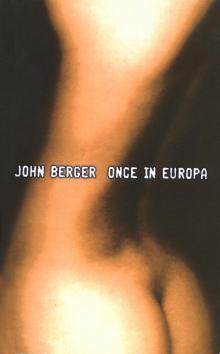 Once in Europa
Once in Europa To the Wedding
To the Wedding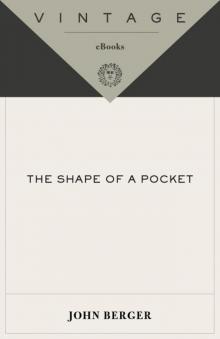 The Shape of a Pocket
The Shape of a Pocket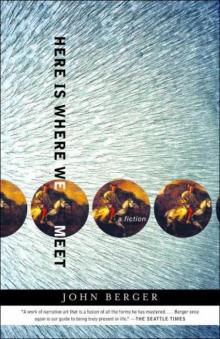 Here Is Where We Meet
Here Is Where We Meet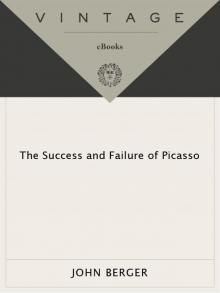 The Success and Failure of Picasso
The Success and Failure of Picasso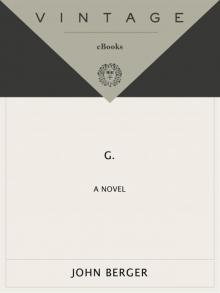 G.
G.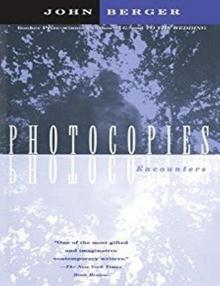 Photocopies: Encounters
Photocopies: Encounters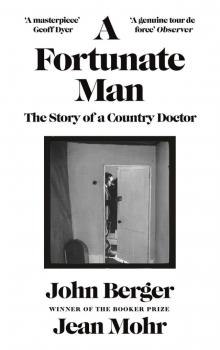 A Fortunate Man: The Story of a Country Doctor
A Fortunate Man: The Story of a Country Doctor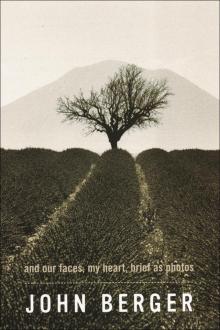 And Our Faces, My Heart, Brief as Photos
And Our Faces, My Heart, Brief as Photos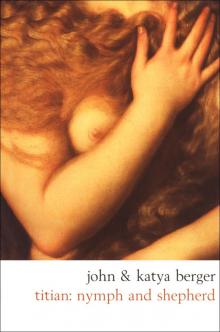 Titian
Titian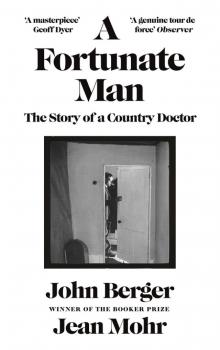 A Fortunate Man
A Fortunate Man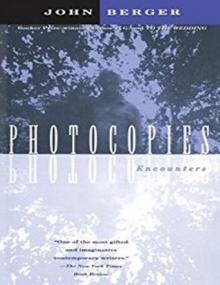 Photocopies: Encounters (Vintage International)
Photocopies: Encounters (Vintage International)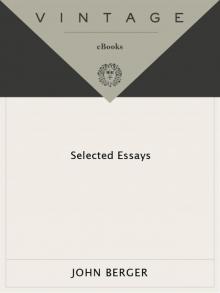 Selected Essays of John Berger
Selected Essays of John Berger